Exodus 7:14, The ten plagues. The ten plagues were Elohim’s judgment against the gods and idols of Egypt (Exod 12:12; 33:4; Num 33:4). Here are the list of plagues and possible suggestions as to which gods of Egypt YHVH was judging.
The first plague: water turns to blood—a judgment against abortion (the Egyptians threw their babies into the Nile for sacrificial purposes) and against materialism (since fewer children mean fewer expenses for a family, and the Nile River was the source of Egypt’s prosperity).
The second plague: frogs — a judgment against pride (frogs puff themselves before they croak) and environmentalism or animal worship. In America, fore example, after 9/11, how many bumperstickers did we see that had the words “pride” on them, and “God bless America” as if YHVH is duty-bound to bless America? How can YHVH bless a nation that refuse to repent and turn from its wicked ways?
The third plague: lice—a judgment against pride and narcissism (self worship), since the Egyptians were highly focused on their personal appearance and hygiene, their appearance and in shaving of body hair.
The fourth plague: flies—a judgment against devil worship, occultism and witchcraft (i.e., the whole religious system of Egypt). A biblical name for Satan was Beelzebub, or lord of the flies (Matt 2:25–27; Luke 11:15–19).
The fifth plague: Livestock died—a judgment against transportation and commerce.
The sixth plague: boils—a judgment against the Egyptians obsession with their bodies and faith in medical science.
The seventh plague: hail—a judgment against their agriculture industry and earth worship.
The eighth plague: locusts—a judgment against Egypt’s food production. The Nile River and its delta was one of the bread baskets of the ancient world and a source of great wealth to Egypt.
The ninth plague: darkness—a judgment against Egypt’s intelligentsia and religious system, which was spiritually devoid of the light of truth.
The tenth plague: the death of the firstborn—a judgment against Egypt’s future and posterity.
The destruction of Pharaoh and his armies in the Red Sea—a judgment against Egypt’s political and military might.
Is YHVH Elohim bringing America and other “Christian” nations into judgment for the sins they have committed against him even has he brought judgment against the gods of Egypt? What are the similarities between gods of ancient Egypt and those of western and Christian culture? In America, for example, in recent years, there has been a marked increase in adverse weather conditions, natural catastrophes, terrorism, bank and financial failures, personal and corporate bankruptcies, high unemployment and inflation rates, and high foreclosure rates on homes to name a few possible judgments against a nation that has turned its back on Elohim and the Bible.
If my people, which are called by my name, shall humble themselves, and pray, and seek my face, and turn from their wicked ways; then will I hear from heaven, and will forgive their sin, and will heal their land. Now mine eyes shall be open, and mine ears attent unto the prayer that is made in this place. For now have I chosen and sanctified this house, that my name may be there for ever: and mine eyes and mine heart shall be there perpetually. And as for thee, if thou wilt walk before me, as David thy father walked, and do according to all that I have commanded thee, and shalt observe my statutes and my judgments; then will I stablish the throne of thy kingdom, according as I have covenanted with David thy father, saying, There shall not fail thee a man to be ruler in Israel. But if ye turn away, and forsake my statutes and my commandments, which I have set before you, and shall go and serve other gods, and worship them; then will I pluck them up by the roots out of my land which I have given them; and this house, which I have sanctified for my name, will I cast out of my sight, and will make it to be a proverb and a byword among all nations. (2 Chron 7:14–20)


